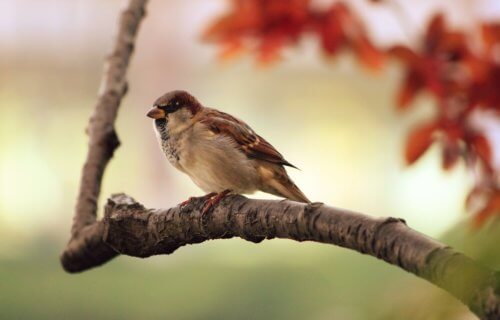DURHAM, N.C. — If you’ve ever been unimpressed by the melodies of birds chirping outside your window in the morning, just give them a few hours. Their songs will probably be a lot better by the afternoon. That’s the main finding of a new study investigating why birds tend to be so loud early in the morning. In short, they’re just warming up for a better performance later on in the day.
Researchers from Duke University say that male birds spend their mornings practicing their singing and refining their vocal cords. Why? In anticipation of a bigger performance later on, of course! The stakes are quite high for these concerts as well: male birds use their songs to both attract potential mates and ward off rivals.
“It’s like they’re warming up backstage, before the sun comes up and the curtain rises,” says study co-author Stephen Nowicki, a biology professor at Duke, in a release.
The reasons behind songbirds’ early morning performances have eluded scientists for decades. Some theorize that birds sing in the morning simply because it’s a quiet time of the day, and thus the best time to make some noise. Others hypothesize that birds just don’t have much else to do in the wee hours of the morning due to lack of sunlight.
Listening to the songs of swamp sparrows
Now, this new set of research is proposing the “warm-up hypothesis.” To test this theory, the research team recorded 11 male swamp sparrows for two or three mornings in a row. Each morning, the birds were recorded between 2 A.M. and noon.
Swamp sparrow songs are usually a simple trill of just five notes, which is then repeated continually five to 10 times per second.
“It sounds a bit like a melodious police whistle,” professor Nowicki explains.
Moreover, these short melodies aren’t easy. Birds must balance competing speed and dexterity demands, all while switching between notes by opening and closing their beaks. It’s not something us humans think about all that often; but for a bird to quickly switch between high and low notes, they must precisely coordinate their breathing and beak movements.
Among the studied swamp sparrows, researchers measured each bird’s “trill rate” and vocal course as the mornings progressed.
This process revealed some major revelations. The sparrows started singing as early as 2:30 in the morning on some days. But their songs were much different during these hours in comparison to later on in the morning after sunrise.
A complex statistical analysis of the songs showed that the birds usually take things much easier to start; singing at a slower rate, or with less range. It’s only after dawn, and hundreds of earlier songs, that the sparrows’ songs become much faster and encompass both higher and lower pitches.
Birds sing better after warming up, too
In a nutshell, the study concludes that the longer the sparrows sang, the better their songs became.
“They’re able to perform more difficult songs later in the morning,” adds first study author Jason Dinh, a biology Ph.D. student.
The study’s authors can’t say for sure if warming up helps birds in the same way it does human singers, but they speculate that practice gets birds’ blood flowing and temperature up similarly to people.
The study is published in Animal Behaviour.
